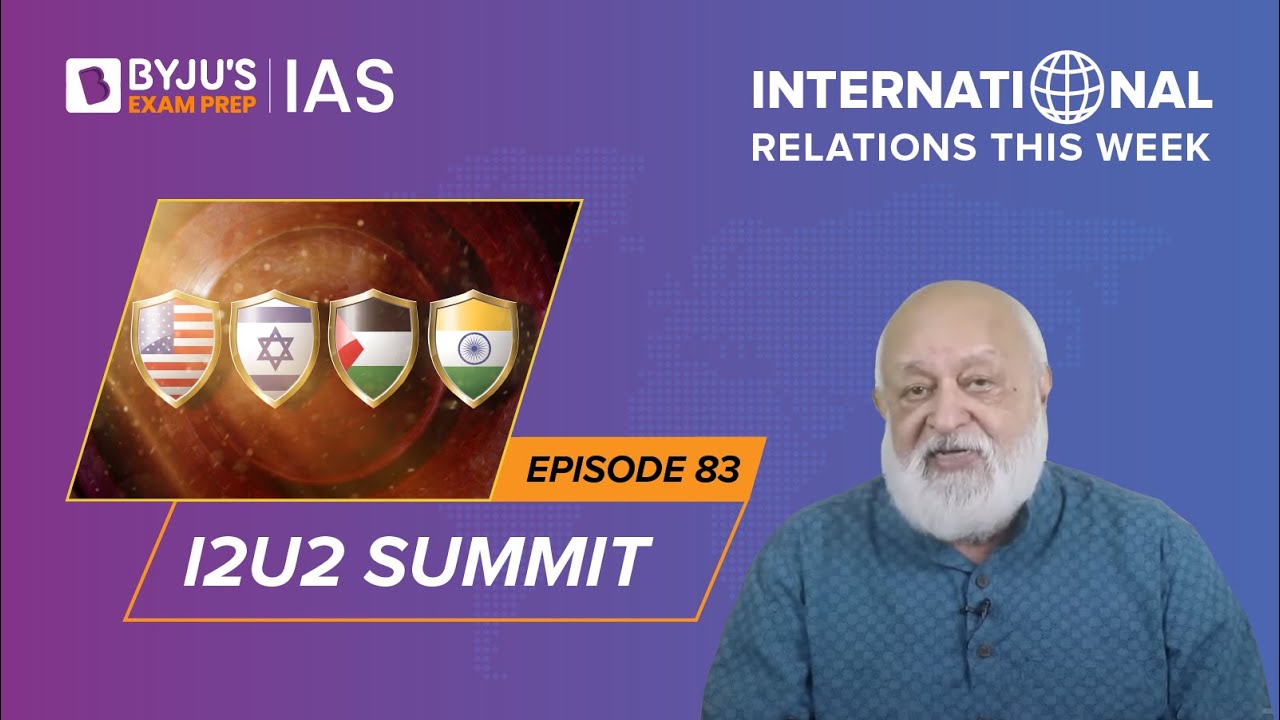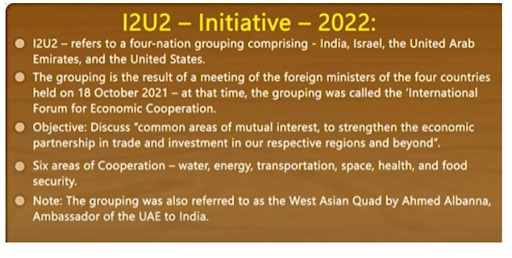International relations is a very important segment of the UPSC syllabus. In this series, we present an analysis of the most important international issues and developments that occurred over the past week relevant for the IAS exam. In this article, you can learn more about the visit to Iran by Russian President Vladimir Putin, and United States President Joe Biden’s visit to the Middle East as well as the climate change and crisis.

TABLE OF CONTENTS
1. Climate Change and Crisis 2. Russian President Vladimir Putin’s visit to Iran 3. United States President Joe Biden’s Visit to the Middle East 4. I2U2
Introduction: Great powers of Europe and the Americas are facing the brunt of climate emergencies and their impact on their economies, geopolitics and strategies.
Internal dislocation and political instability have amplified the impact of the climate crisis on the Great Powers.
Heat Wave and Flash Fires
- Extreme heatwave conditions in Europe, the US and other parts are the results of climate change caused due to anthropological activities.
- Global wind patterns are affected due to an increase in the global temperature mainly on account of climate change which has increased the temperature in Antarctica by over 15° and over 3° in the Arctic region.
- The extreme temperatures in the U.S. are said to be due to a split in the jet stream resulting in more frequent and intense heat waves over the American continent.
- Forest fires rising in Amazon rainforests can be contributed to
- Clearing of forests
- Land uses changes
- Drop in carbon sinks
Immediate Threat:
- Flash fires are happening close to the populated city centres resulting in numerous deaths.
- Deaths of more than 1000 people have been attributed to the heatwave in Portugal and Spain alone.
- Around 96% of the Portugal mainland was suffering severe drought at the end of June 2022.
- These fires are also affecting the tourism sector by keeping away visitors.
- No technological means have been successful in controlling flash fires so far.
- Hot weather and low rainfall have dried out large areas of forest and grassland across much of Europe, creating suitable conditions for wildfires to spread.
Who will Lead the Fight against Climate Change?
- The tendency by great powers such as the U.S., Russia, China and European nations to push back climate emergencies with a notion that it concerns only microstates in the South Pacific and the future of developing countries in Africa and South Asia and rainforests, and indigenous people has led to the negligence of immediate actions to tackle climate crisis.
- Increasing uncertainty in weather incidents such as an unprecedented 17000 lightning strikes in a year in Alaska, and floods in India, Pakistan, and Africa calls for immediate global action against climate emergency.
- A recent judgment by the US Supreme Court limiting the power of the Environmental Protection Agency (EPA) to regulate the emission of greenhouse gases is set to impact its commitment towards climate change.
- The inability of the States to transition quickly enough away from fossil fuels has put the objective of holding global warming to 1.5 degrees beyond reach.
- In Europe, the war in Ukraine has made the countries rethink their energy policies.
India’s concentrated effort on Climate Change:
- At the CoP26, Glasgow, Indian PM Narendra Modi declared a five-fold strategy called the ‘Panchamrita’ to achieve net zero emission by 2070. These five points include:
- India will get its non-fossil energy capacity to 500 gigawatts (GW) by 2030
- India will meet 50 per cent of its energy requirements from renewable energy by 2030
- India will reduce the total projected carbon emissions by one billion tonnes from now onwards till 2030
- By 2030, India will reduce the carbon intensity of its economy by less than 45 per cent
- So, by the year 2070, India will achieve the target of Net Zero
- International Solar Alliance was launched at the United Nations Climate Change Conference in Paris in 2015 by India and France.
- The National Action Plan on Climate Change outlines existing and future policies and programs addressing climate mitigation and adaptation. The Action Plan identifies eight core “national missions”.
Way Forward:
- Climate change represents global problems that require global solutions. The solution to tackle the problem is the will and the commitment to work towards the solution while helping each other at an individual and a global level.
- Though India is not in a position to decisively influence either diplomatically or build on consensus, it can lead the non-aligned countries of Africa, Latin America and South Asia in a new multilateral forum to take collective action.
2. Russian President Vladimir Putin’s visit to Iran
Context: Russian President Vladimir Putin visited Iran on his first visit outside the former Soviet sphere since Russia’s invasion of Ukraine for a trilateral summit with Iran and Turkey.
Introduction:
- Russia, Iran and Turkey in a trilateral meeting discussed the nuclear deal and the Syrian conflict.
- Russia and Turkey discussed the Syrian civil war and a United Nations proposal to allow grain exports from Ukrainian ports via the Black Sea.
Read on New Dimension of Iran-Russia Relationship in CNA dared July 23, 2022.
Implications of the Russia-Turkey meet:
- Recently, Russian, Turkish, Ukrainian and United Nations officials reached a provisional agreement on certain aspects of a deal to ensure the export of 22 million tonnes of grain and other agricultural products trapped at Ukraine’s Black Sea ports.
- The recent meeting between Russian President Vladimir Putin and Turkey President Recep Tayyip Erdogan is a major step towards clearing the remaining hurdles in easing the food crisis that has sent prices of vital commodities such as wheat and barley soaring.
- For Turkey, a NATO member, which has not imposed sanctions on Russia, the meeting is a chance to project its influence as a regional power, while attempting to mediate between Russia and Ukraine as it shares the Black Sea coast with both countries and engaging in a delicate and balancing act between Russia and the West.
- Turkey has sought to use its ties with Russia to try to gain concessions from the West.
- Turkey has blocked Sweden and Finland from joining NATO in return for a set of actions and promises that those countries would act against Kurds whom Turkey views as terrorists.
- Turkey depends on the Russian market to address its runaway inflation and a rapidly depreciating currency.
- This trilateral summit is also crucial in addressing the Syrian conflict where Iran, Russia and Turkey all have a strong military presence.
- Iran and Russia have backed Syrian President Bashar Al Assad’s government, while Turkey has supported armed opposition factions.
- Turkey is expected to carry out a new military offensive in northern Syria to drive away US-backed Syrian Kurdish fighters from its borders as a part of its plan to create a ‘Safe Zone’ along its border with Syria that would encourage the voluntary return of Syrian refugees. Russia was strongly against this move.
- This trilateral meeting can be seen as an effort to encourage a political settlement.
Conclusion:
The relationship between Russia and Turkey has been rocky at times. Both countries have in recent years found themselves on opposite sides of conflicts in Libya, Syria and Azerbaijan. Turkey has also angered Russia by selling Turkish-made drones to Ukraine. Both should work together to overcome the problems of their failing economies and border conflicts.
3. Biden’s Visit to Israel and Saudi Arabia
Context: Recently, the President of the United States, Joe Biden made his first trip to the Middle East, visiting Israel and Saudi Arabia.
Significance of this visit to Geo-Politics:
- As the Iran nuclear talks have hit an impasse, the trip was crucial in strengthening America’s traditional partnerships & alliances in West Asia, involving Israel and Sunni Arab countries.
- Mr. Biden’s visit to Saudi Arabia was a crucial step after the U.S. branded Saudi Arabia a “pariah” over the murder of dissident Saudi journalist Jamal Khashoggi in 2018.
- Opec Plus approved a modest increase in production over the U.S. appeals to pump more oil to bring down oil prices days before the president’s trip was announced.
- In Israel, Biden reassured America’s efforts to stop Iran from getting a nuclear bomb.
- Biden was careful not to criticise the Israeli occupation of the Palestinian territories during his visit to the Palestinian West Bank.
- Biden’s talks with President Abbas of the Palestinian National Authority were the first between a US president and a Palestinian leader since the Obama administration. The Palestinians boycotted the Trump administration over a peace plan they saw as biased against them.
- Tensions are high between Palestinians and Isreal over the killing of Palestinian-American journalist Shireen Abu Akleh in May during an Israeli army raid in the West Bank.
- The U.S. also promised humanitarian assistance to Palestine in the form of food and Covid-19 vaccines.
- This is seen as part of efforts to stabilise oil markets rattled by the war in Ukraine, through a re-engagement with a long-time key U.S. strategic ally and major energy supplier.
Read on Objectives of U.S. foreign policy in CNA dated July 18, 2022
Conclusion:
The United States wants Saudi Arabia and other OPEC countries to pump more oil to keep oil prices low amid the ongoing Russia-Ukraine war. Also, to stop Iran from becoming a threat, the US needs Israel and other Gulf countries to have good relations. These reasons make Biden’s Middle East visit an important geopolitical event in the region.
Context: Recently, Prime Minister Modi participated in the first-ever I2U2 Virtual Summit along with the heads of state of the UAE, Israel and the US.

Read more on I2U2 in the linked article.
International Relations This Week: Episode 83:-Download PDF Here
| Related Links | |||
| Israel Palestine Conflict | India-Afghanistan Relations | ||
| India – US relations | India’s Bilateral Relations |
||
| ASEAN | India-Australia Relations | ||
Comments